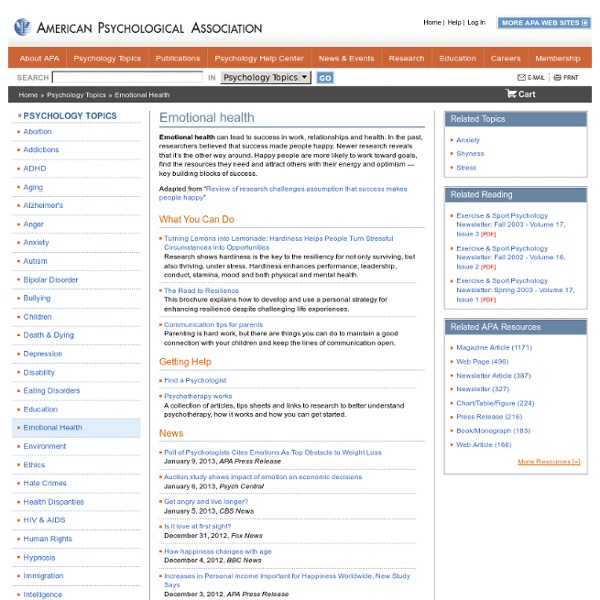



http://www.apa.org/topics/emotion/index.aspx
The 100 Best Lifehacks of 2010: The Year in Review Happy New Year everyone! It’s the first week of 2011 and many of us are getting ready to kick off the brand new year with a big bang. As we start off 2011 with our new resolutions and goals, let us now look back at the best posts at Lifehack in the past year. In this review post, I have gathered 100 of the best LifeHack articles in 2010. These articles have been selected based on your votes and how much YOU have talked about them in social media (Facebook and Twitter). I have categorized these 100 articles into 11 main categories of Overall Personal Growth, Maximizing Productivity & GTD, Lifestyle & Habits, Inspiration & Motivation, Goal Achievement & Success, Emotional Mastery, People Skills & Relationships, Communications & Writing, Business & Career, Creativity & Inspiration, Family and Miscellaneous.
The Ten Most Revealing Psych Experiments Psychology is the study of the human mind and mental processes in relation to human behaviors - human nature. Due to its subject matter, psychology is not considered a 'hard' science, even though psychologists do experiment and publish their findings in respected journals. Some of the experiments psychologists have conducted over the years reveal things about the way we humans think and behave that we might not want to embrace, but which can at least help keep us humble. That's something. 1. 'Lord of the Flies': Social Identity Theory
Relationship Rules Human beings crave intimacy, need to love and be loved. Yet people have much trouble doing so. It's clear from the many letters I get that lots of folks have no idea what a healthy relationship even looks like. Because I care about these things, and care about the environments children grow in, I'm using this space as an attempt to remedy the problem—again. From many sources and many experts, I have culled some basic rules of relationships. How Addiction Changes a Child’s Role in the Family – Scapegoat, Hero, Super Enabler, or Disappearing Act We are thrilled to have a guest post from Ken Powers, co-author of We Codependent Men We Mute Coyotes. Below is an excerpt from his book as it pertains to childhood roles that persist when addiction is present. Post by: Ken Powers
Using the new Positive Psychology The theory in Authentic Happiness is that happiness could be analyzed into three different elements that we choose for their own sakes: positive emotion, engagement, and meaning. And each of these elements is better defined and more measurable than happiness. The first is positive emotion; what we feel: pleasure, rapture, ecstasy, warmth, comfort, and the like. An entire life led successfully around this element, I call the “pleasant life.” The second element, engagement, is about flow: being one with the music, time stopping, and the loss of self-consciousness during an absorbing activity. I refer to a life lived with these aims as the “engaged life.”
The Pursuit of Happiness: Can We Have an Economy of Well-Being? - Up Front Blog At this year’s American Economic Association meetings in Denver, there were the usual panels on topics like the financial crisis and the real estate market. More unusual was a session on whether happiness measures should replace GNP. The latter was written up (rather skeptically) by The Wall Street Journal. That same month there was a similar panel at the World Economic Forum in Davos, with Jeffrey Sachs, the once wunderkind of free markets, calling for happiness as the next United Nations Millennium Development Goal. That session was written up (less skeptically) by The New York Times.
The Top 10 Psychology Studies of 2010 The end of 2010 fast approaches, and I'm thrilled to have been asked by the editors of Psychology Today to write about the Top 10 psychology studies of the year. I've focused on studies that I personally feel stand out, not only as examples of great science, but even more importantly, as examples of how the science of psychology can improve our lives. Each study has a clear "take home" message, offering the reader an insight or a simple strategy they can use to reach their goals , strengthen their relationships, make better decisions, or become happier. If you extract the wisdom from these ten studies and apply them in your own life, 2011 just might be a very good year. 1) How to Break Bad Habits If you are trying to stop smoking , swearing, or chewing your nails, you have probably tried the strategy of distracting yourself - taking your mind off whatever it is you are trying not to do - to break the habit.
Cannabis & Religion - Part One A Joyful Toke Unto The Lord An overview of the intimate link between cannabis and religious ritual. By DEAN CHRISTOPHER Since ancient times, people have used drugs — in groups or individually — as part of religious rituals and for personal spiritual quests. Even without specific references to ingesting mind-altering plants, throughout history the link between substance and spirituality has been indirectly described or can be inferred through logical deduction. Suicide in the elderly Howard Cattell + Author Affiliations Despite the fact that suicide and its prevention continues to be a priority area for health care in the UK, suicide in the elderly remains a neglected subject receiving little interest and research attention. The Green Paper Our Healthier Nation (Secretary of State for Health, 1998) maintained the concept of setting targets for suicide reduction originally proposed in The Health of the Nation strategy. The new target proposes that by the year 2010 the death rate from suicide and undetermined injury will be reduced by at least a further sixth (17%) from the baseline of 1996.